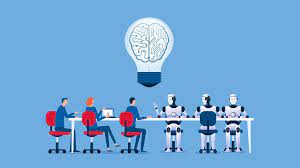
Artificial intelligence (AI) is transforming the corporate training landscape at a rapid pace, revolutionizing how employees at all levels enhance their skills and knowledge. With the advent of cutting-edge AI technologies, businesses are now able to personalize learning experiences, streamline the training process, and achieve better outcomes.
One of the most significant ways AI is changing the face of corporate training is through customized learning paths. AI algorithms can analyze an individual’s current knowledge level, learning pace, and preferred learning style. This enables the creation of tailored training programs that cater to the specific needs of each employee rather than adopting a one-size-fits-all approach. As a result, learners can engage with material that is most relevant to them, which can lead to increased motivation and better retention of information.
Moreover, AI-driven analytics are making it easier for corporations to measure the effectiveness of their training programs. By collecting data on how employees interact with training materials, AI can provide valuable insights into which parts of a program are working well and which require improvement. This real-time feedback allows companies to continually refine their training strategies and content for optimal effectiveness.
Another impactful application is the use of chatbots and virtual assistants in training. These AI-powered tools can provide instant support and guidance to learners, answering questions and offering assistance anytime and anywhere. This not only makes learning more accessible but also reduces the workload on human instructors, allowing them to focus on creating more nuanced and high-value educational experiences.
Gamification has also been enhanced by AI in corporate training environments. By incorporating elements such as scoring systems, competitive features, and personalized achievement tracking, AI makes learning more engaging and fun. This increased engagement is likely to improve learner retention rates and incentivize employees to further invest in their professional development.
Furthermore, AI technology enables efficient content curation by aggregating resources from different platforms that are most pertinent to the learning objectives. By sifting through vast amounts of information and presenting only what is necessary, AI saves time for both learners and trainers.
Lastly, with the global workforce becoming increasingly remote, AI promotes inclusivity by facilitating remote training that adapts to various time zones and geographical locations. It also breaks down language barriers with real-time translation features that allow employees from different linguistic backgrounds to access the same quality training.
In conclusion, through personalization, real-time analytics, accessibility enhancements, gamification advances, efficient content management, and support for remote inclusivity—AI is reshaping corporate training into a more effective, enjoyable, and adaptive component of professional development. As AI technology continues to evolve, we can expect these trends to deepen further with even more innovative ways for organizations to train their workforce.
